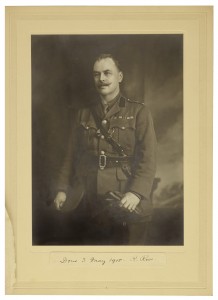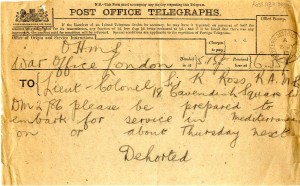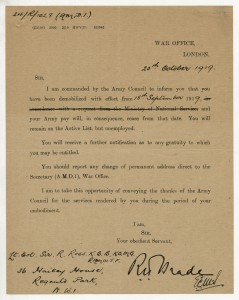The collection spans the whole of his career from his time in the Army in India in the 1880s and 1890s to his death in 1932. It records his major achievements, expeditions, publications and projects, including his contribution to the prevention and treatment of tropical diseases during the First World War.

Sir Ronald Ross in uniform, 1915
The Archives team will be writing regular blogs over the period of the commemoration, using archive material to show what Ross was doing.
Through creating the Improving Health in Wartime exhibition, we have been given the opportunity to research Ross’ various roles with the War Office, his attitude to the war, the opinions of his tropical medicine colleagues and his other activities during this period.
In brief Ross was appointed as Consulting Physician in Tropical Diseases to the Hospitals for Indian Troops in England in December 1914, this involved his visiting hospitals in Brighton, Bournemouth, Brockenhurst and Netley.
In July 1915 he was appointed Temporary Lieutenant Colonel, RAMC and was sent to the Mediterranean Expeditions Force as Consulting Physician on Tropical Diseases. He was based in Alexandria in Egypt for four months and returned to Britain in November when he reverted back to the rank of Lieutenant-Colonel in RAMC, Territorial Force.
In 1916, he appears not to do as much war work, he is working on mathematics and writes papers on pathometry with Hilda Hudson and he is also made vice-president of the Poetry Society.
In 1917 he was appointed Consultant for Malaria, Southern, Eastern, Aldershot Commands and London district and given a room at the War Office. Much of his work related to coordinating the treatment of servicemen who returned to the UK with malaria including work at the Malaria Department at the 4th London General Hospital. He also gave advice and guidance to those working on trying to prevent the spread of malaria to UK citizens, over 500 were infected. In November he travelled to Italy and Salonika to advise on malaria, this is where he survived a torpedo attack.
He returned to the UK in January and continued his work at the War Office apart from a trip to France in July on malaria duty. When the war ended, he continued to treat and advise on military pensioners who were suffering from the effects of malaria.
The Ross collection is catalogued and is available on our online catalogue on the Archives website at: or for further information, please contact the Archives at: archives@lshtm.ac.uk.
We are looking forward to bringing you new instalments on Ross’ War over the coming months.








